
Journal of Political Power
Scope & Guideline
Decoding Power Relations in Political Frameworks
Introduction
Aims and Scopes
- Theoretical Frameworks of Power:
The journal focuses on developing and critiquing theoretical frameworks related to power, including but not limited to concepts such as soft power, state power, and the dynamics of power in various political contexts. - Power and Resistance:
A core area of interest is the interplay between power and resistance. The journal explores how marginalized groups resist dominant power structures, contributing to discussions on social justice and political agency. - Political Economy and Governance:
The journal examines the intersections of political power with economic structures, analyzing how governance models, neoliberalism, and authoritarian practices shape political realities across different regions. - Global and Comparative Politics:
Research published in the journal often addresses global power dynamics, including case studies from various countries and regions, which provide comparative insights into political strategies and outcomes. - Cultural and Social Dimensions of Power:
The journal also delves into the cultural aspects of political power, exploring how art, discourse, and social movements influence and challenge existing power relations.
Trending and Emerging
- Neoliberalism and Authoritarianism:
There is a significant increase in research examining the relationship between neoliberal policies and authoritarian governance. This trend is crucial in understanding contemporary political crises and the rise of far-right movements globally. - Soft Power Dynamics:
The journal has seen a surge in articles discussing soft power's complexities and implications, particularly in the context of international relations and cultural diplomacy, highlighting its relevance in contemporary geopolitics. - Environmental Politics and Power:
Emerging discussions around climate politics and environmental justice are becoming prominent, reflecting a growing recognition of the intersection between power dynamics and environmental issues. - Digital Politics and Social Media:
Research focusing on the role of social media and digital platforms in shaping political power and public discourse is increasingly prevalent, acknowledging the transformative impact of technology on political engagement. - Intersectional Analyses of Power:
The journal is increasingly featuring works that examine power through intersectional lenses, including race, gender, and class, emphasizing the need for more inclusive frameworks in political analysis.
Declining or Waning
- Traditional Views on Power:
There seems to be a waning focus on traditional, linear models of power that do not account for the complexities of contemporary political landscapes. The shift towards more nuanced and multidimensional understandings indicates a move away from simplistic power analyses. - Historical Power Dynamics:
Research that solely focuses on historical analyses of power without connecting to present-day implications is becoming less frequent. Scholars appear more interested in contemporary applications of power theories rather than historical recounting. - Focus on Western Political Paradigms:
The journal has begun to feature fewer articles centered exclusively on Western political paradigms, indicating a broader interest in global perspectives and non-Western political theories. - Static Models of Resistance:
Studies that present static models of resistance without considering the evolving nature of social movements and their interactions with power structures are becoming less prevalent. There is a growing emphasis on dynamic, context-sensitive analyses.
Similar Journals
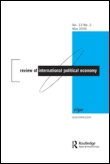
REVIEW OF INTERNATIONAL POLITICAL ECONOMY
Illuminating the complexities of political and economic systems.REVIEW OF INTERNATIONAL POLITICAL ECONOMY is a premier journal published by Routledge Journals, Taylor & Francis Ltd, recognized for its critical contributions to the fields of Political Science, International Relations, and Economics. Established in 1994, this journal has consistently been ranked in the top quartile (Q1) across its subject areas, reflecting its influence and prestige within the academic community. With an impressive Scopus ranking, it holds the 11th position among 706 journals in Political Science and International Relations, marking it in the 98th percentile, and ranks 42nd out of 1466 in Sociology and Political Science. As an indispensable resource for researchers, professionals, and students, it aims to advance scholarly discourse by publishing high-quality, innovative research that addresses the complexities of global political and economic systems. Situated in the United Kingdom, the journal serves as a vital platform for interdisciplinary dialogue, fostering a deeper understanding of international political economy dynamics.
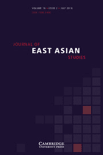
Journal of East Asian Studies
Connecting Scholars to East Asia's Rich TapestryThe Journal of East Asian Studies, published by Cambridge University Press, serves as a pivotal academic platform for scholars and practitioners who are dedicated to the multifaceted exploration of East Asian societies. With an ISSN of 1598-2408 and an E-ISSN of 2234-6643, this journal has been disseminating significant research since its inception in 2008 and continues to be a crucial resource for advancing scholarly dialogue up to 2024. Recognized for its contributions, it holds prestigious quartile rankings in various fields, including Q2 in Development, Political Science and International Relations, and Q3 in Economics and Econometrics, showcasing its broad impact within the social sciences. With Scopus rankings reflecting its robust presence in political science, sociology, and economics, this journal appeals to a wide audience of researchers, educators, and students. As it aims to foster a comprehensive understanding of East Asian political, economic, and social dynamics, the Journal of East Asian Studies remains an essential resource for those looking to engage deeply with the complexities of this vital region.
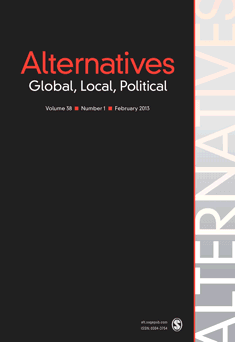
ALTERNATIVES
Illuminating Contemporary Issues through Interdisciplinary ResearchALTERNATIVES is a prominent academic journal published by SAGE Publications Inc, focusing on critical issues in Political Science and Sociology. Established in 1975, the journal has made significant contributions to the understanding of international relations and sociopolitical dynamics, boasting a commendable impact factor that places it in the Q2 category for both fields as of 2023. Its current Scopus rankings reflect its standing in the academic community, with a rank of 201/706 and a 71st percentile position in Political Science and International Relations, along with a 487/1466 rank and 66th percentile position in Sociology. ALTERNATIVES serves as a critical platform for scholars, researchers, and students alike, offering invaluable insights and access options to enhance discourse on contemporary sociopolitical issues. Its commitment to fostering innovative research and interdisciplinary dialogue makes it an essential resource for those engaged in the complexities of social sciences.
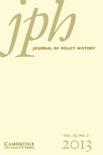
Journal of Policy History
Exploring the Roots of Policy-MakingJournal of Policy History, published by Cambridge University Press, is a well-regarded periodical focusing on the intricate intersections of public administration, sociology, and political science. With its ISSN 0898-0306 and E-ISSN 1528-4190, this journal has consistently contributed to the academic discourse since its inception in 1989, providing a platform where scholars can explore the historical context of policy-making and its implications on contemporary society. While the journal currently holds a Q4 ranking in both Public Administration and Sociology and Political Science categories, it presents a valuable opportunity for researchers and practitioners to disseminate their findings, aiming to enhance understanding and influence future policy development. Although not open access, the journal remains an essential resource for those dedicated to the advancement of knowledge within the framework of policy history, shaping the landscape of social sciences through rigorous analysis and scholarly engagement.
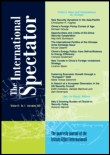
International Spectator
Shaping Perspectives on International Relations.International Spectator, published by Routledge Journals, Taylor & Francis Ltd, stands as an eminent peer-reviewed journal in the field of Political Science and International Relations. Established in 1983 and continuing its impactful discourse through 2024, the journal boasts a commendable Q1 ranking in 2023, confirming its position among the top-tier journals within its discipline. With a Scopus ranking of 121 out of 706, it lies in the 82nd percentile, showcasing the robustness of its scholarly contributions. Although not designated as an open-access journal, International Spectator remains essential reading for researchers, professionals, and students seeking to navigate the complexities of international politics. The journal aims to publish high-quality research that engages with global political dynamics, providing a platform for innovative ideas and critical analyses that shape the understanding of international relations today.

JOURNAL OF HISTORICAL SOCIOLOGY
Exploring the Intersections of Society and HistoryJOURNAL OF HISTORICAL SOCIOLOGY, published by Wiley, stands as a crucial platform for the exploration and dissemination of interdisciplinary research that merges sociology with historical inquiry. With its ISSN 0952-1909 and E-ISSN 1467-6443, this journal provides an invaluable resource for scholars dedicated to understanding the intricate relationships between social structures and historical processes. Though coverage has been discontinued in Scopus as of 2022, the journal has previously held impressive rankings, including the 86th percentile in History within the Arts and Humanities category and a respectable standing in Sociology and Political Science. The journal prioritizes open access options, promoting wider accessibility to its critical analyses and diverse methodologies, thereby fostering academic dialogue and collaboration. By contributing to this journal, researchers and students alike enrich their understanding of societal transformations through a historical lens, embarking on a path of inquiry that is both timely and essential in today's rapidly changing world.
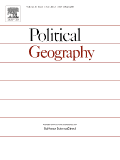
POLITICAL GEOGRAPHY
Pioneering Research at the Crossroads of Geography and PoliticsPOLITICAL GEOGRAPHY is a leading journal published by Elsevier Sci Ltd, a prestigious name in academic publishing, committed to advancing knowledge in the fields of geography, planning and development, history, sociology, and political science. With an impressive impact factor reflected in its Q1 ranking across multiple disciplines including Geography and Planning and Development, this journal stands at the forefront of interdisciplinary research, exploring the complex interplay between geopolitics, social structures, and spatial dimensions. The journal, with ISSN 0962-6298 and E-ISSN 1873-5096, provides a platform for rigorous empirical research and theoretical advancements, making it essential reading for scholars, practitioners, and students aiming to engage deeply with contemporary political and geographic issues. As it converges research from its inception in 1983, POLITICAL GEOGRAPHY continues to influence discussions and drive innovations within its field, thus solidifying its role as a vital resource for advancing understanding of the spatial aspects of political phenomena.
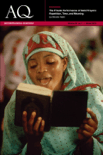
ANTHROPOLOGICAL QUARTERLY
Unveiling Cultures Through Rigorous InquiryANTHROPOLOGICAL QUARTERLY, published by the George Washington University Institute of Ethnographic Research, stands as a vital resource in the field of anthropology and broader arts and humanities studies. With an ISSN of 0003-5491 and an E-ISSN of 1534-1518, this esteemed journal has been contributing to academic discourse since its establishment in 1981. The journal holds a respected position in both the Q2 category for Anthropology and the Q2 category for Arts and Humanities (miscellaneous), demonstrating its impact and relevance, as evidenced by its rank of #152 out of 502 in the Social Sciences sector for anthropology and rank of #179 out of 552 in the Arts and Humanities field. Researchers, professionals, and students can rely on ANTHROPOLOGICAL QUARTERLY for rigorous peer-reviewed articles that push the boundaries of ethnographic research and anthropological theory, addressing contemporary issues with scholarly precision. The journal’s commitment to fostering critical analysis and interdisciplinary perspectives establishes it as an essential platform for advancing knowledge within its diverse and dynamic field.
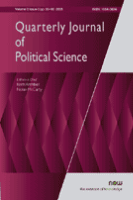
Quarterly Journal of Political Science
Illuminating the Dynamics of Politics and SocietyQuarterly Journal of Political Science is a leading publication in the fields of Political Science and International Relations, published by NOW PUBLISHERS INC since 2006. With its ISSN 1554-0626 and E-ISSN 1554-0634, the journal is recognized for fostering rigorous scholarly discourse and innovative research contributing to various dimensions of political science and sociology. Holding notable Q1 rankings in both Political Science and International Relations, as well as in Sociology and Political Science, it reflects an impressive impact in the academic community, evidenced by its Scopus rank placing it in the top 82nd and 77th percentiles, respectively. The journal's rigorous peer-review process and commitment to high-quality research make it an essential resource for researchers, professionals, and students eager to engage with cutting-edge political analysis and theory. Although it does not have open access options at this time, the Quarterly Journal of Political Science remains a pivotal platform for disseminating influential ideas and advancing scholarly dialogue in politically charged landscapes.
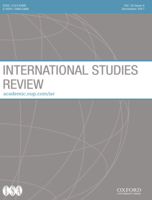
International Studies Review
Connecting Scholars to Critical Global InsightsInternational Studies Review is a premier academic journal published by Oxford University Press, dedicated to exploring the intricacies of global politics, international relations, and geographical dynamics. With an impressive impact factor and ranked in the top quartile (Q1) across both Geography, Planning and Development and Political Science and International Relations, it continues to be a vital resource for scholars and practitioners alike. The journal has been at the forefront of critical discussions and analyses in the field since its inception in 1999 and will be publishing up to 2024. With a Scopus rank of #32 in Political Science, placing it in the 95th percentile, it is recognized for its rigorous research and impactful contributions. The International Studies Review primarily caters to researchers, professionals, and students who seek to deepen their understanding of contemporary international issues, making it an essential platform for interdisciplinary scholarship in an ever-evolving global landscape.